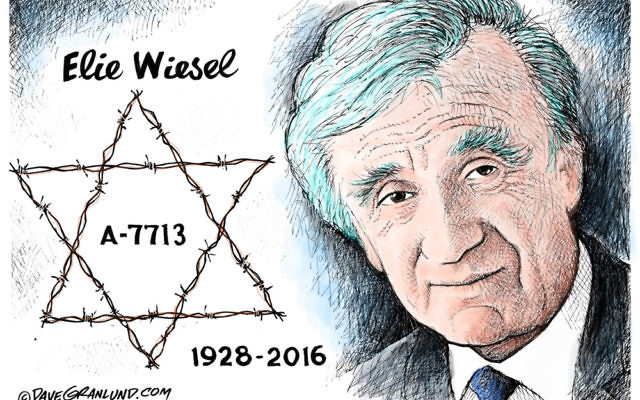Social Justice in Memory of Elie Wiesel
One Man’s Opinion by Eugen Schoenfeld
The noted philosopher Isaiah Berlin quotes a response by historian Lewis Namier to a query from an English peer.
The peer asked why Namier, a Jew, researched and wrote only about English history and not about the history of his own people. Namier’s reply: “There is no modern Jewish history. There is only a Jewish martyrology, and that is not amusing enough for me.”
To a great extent we Jews have indeed been preoccupied with our martyrs who died al kiddush Hashem — for the sake of sanctifying G-d’s name. This emphasis on dying for the sanctification of G-d’s name has led us to develop a view that proposes the existence of a relationship between our belief in being “chosen people” and anti-Semitism.
Rabbi Yitzchak Lev, the noted Berdichiver rebbe, in a discourse with G-d asked whether it was perhaps time for G-d to elevate another people to chosen status so that we no longer should suffer.
During memorial services we offer a prayer for those killed in the Holocaust because of their loyalty to G-d — in short, that the members of my family died martyrs’ deaths.
That is not so. Martyrs are given a choice. They can choose to die, or they can renounce their faith and live. None of us who died or survived the Holocaust was given a choice; the members of my family died tragic deaths at the hands of criminals who rejected the principle of justice.
It is time that we accept reality: Genocide and all forms of holocausts that this world has experienced and continues to experience are the result of the absence of personal virtues and social justice.
The Holocaust was not a unique event in the annals of Jewish history. It was the consequence of a nearly 2-millennia-old perspective that began in the year 380 when Christianity became the official Roman religion. This hostility was introduced by the founders of Christianity through the laws decreed by the Emperor Constantine and his successors.
These laws and the religious principles that motivated their implementation were designed to separate Christianity from Judaism and establish the idea of Christian supersession. This separation was achieved by Paul’s rejection of the two fundamental moral ideals in Judaism: the command to become a holy people in a just society.
How do people become holy? By adding “e” to “human.”
We are born human, but our task is to evolve and elevate ourselves into a higher moral stage to become humane beings. We must develop humane virtues that transcend the stage of being human and thereby fulfill the ideal of becoming a holy people.
That is the part Hillel referred to as the fundamental human character that encompasses the virtues of loving, caring and empathy and thus makes us capable to perform gemilath chassodim, the practice of kindness.
But the elevation of the individual’s character without the creation of a just society is an act that is nullified — that is, without the elevation of society to become just, humanity doesn’t gain anything.
Many Germans were caring people, but their quality was obfuscated by their evil and unjust society.
Elie Wiesel was depicted as the conscience of the world. His Holocaust experience led him to conclude, as I did in my books, that Jewish historical experiences were not so much the consequence of evil individuals, although such people exacerbated them. Instead, like Sodom, they were the consequence of selfish and unjust societies.
He saw the European world as Abraham saw Sodom and Gomorrah: as the epitome of unjust societies. Like the ancient prophets, he sought to implement justice.
The Jewish tragedy, as Wiesel saw it, was the consequence of injustice, which often resulted from wrongly treated historical memories and immoral conceptions in religion. It is time that we the Jewish people, as we have always been leaders in moral issues, reject the ideals of an unforgiving historical memory, renounce any form of genocide and eliminate any justification of genocide.
Let us remember that there should be but one law governing the stranger, the temporary residents and the citizens. We must remember, just as Wiesel would have declared, that we must strive to establish a world governed by the principles of justice.





comments